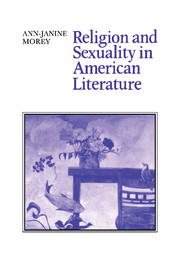Book contents
- Frontmatter
- Contents
- Acknowledgments
- Introduction
- 1 Body Language: Religion, Sexuality, and the Bioluminescence of Metaphor
- 2 The Stubborn Density of Desire: Religion and Sexuality in Nineteenth-Century Fiction
- 3 A Tradition of Divine Lechery: Men Write about the Ministry
- 4 A War of Words: Women Write about the Ministry. The Homiletic writers
- 5 Comfort to the Enemy: Women Write about the Ministry. The Parsonage Romance
- 6 The Fox in the Well: Metaphors of Embodiment in the Androcentric Imagination
- 7 Fatal Abstractions: Metaphors of Embodiment in the Gynocentric Imagination
- 8 Conclusion: Words Are Not the Thing Itself
- Appendix A The Homiletic Novels and Their Authors
- Appendix B The Parsonage Romances and Their Authors
- Bibliography
- Index
- Cambridge Studies in American Literature and Culture
6 - The Fox in the Well: Metaphors of Embodiment in the Androcentric Imagination
Published online by Cambridge University Press: 25 March 2010
- Frontmatter
- Contents
- Acknowledgments
- Introduction
- 1 Body Language: Religion, Sexuality, and the Bioluminescence of Metaphor
- 2 The Stubborn Density of Desire: Religion and Sexuality in Nineteenth-Century Fiction
- 3 A Tradition of Divine Lechery: Men Write about the Ministry
- 4 A War of Words: Women Write about the Ministry. The Homiletic writers
- 5 Comfort to the Enemy: Women Write about the Ministry. The Parsonage Romance
- 6 The Fox in the Well: Metaphors of Embodiment in the Androcentric Imagination
- 7 Fatal Abstractions: Metaphors of Embodiment in the Gynocentric Imagination
- 8 Conclusion: Words Are Not the Thing Itself
- Appendix A The Homiletic Novels and Their Authors
- Appendix B The Parsonage Romances and Their Authors
- Bibliography
- Index
- Cambridge Studies in American Literature and Culture
Summary
In his first sermon of the month, Thomas Marshfield (A Month of Sundays) quotes St. Paul: “So ought men to love their wives as their own bodies.” That this is not so generous a charge as it might seem is immediately confirmed by Marshfield, who goes on to comment: “But most men dislike their own bodies, and correctly. For what is the body but a swamp in which the spirit drowns? And what is marriage, that supposedly seamless circle, but a deep well out of which the man and woman stare at the impossible sun, the distant bright disc, of freedom.” Marshfield's name announces his own boggy predicament, but the language of entrapment specified by the well and the swampiness of the body is not peculiar to this novel. Updike's Rabbit usually seeks a burrow but just as often finds himself in an uncomfortable well, pit, or endless tunnel. In Rabbit, Run he feels “reconciliations rising up like dank walls” as he shrinks from the prospect of returning to his marriage. In Rabbit Redux it is not surprising to find Harry living “in a tight well whose dank sides squeeze and paralyze him.”
In the brief passage from A Month of Sundays above, Updike presents several of the antimonies that characterize the androcentric experience of embodiment. Men are bade to cherish wives and bodies despite a distrust of both. Yet there is a mutuality of experience somewhere along the line, for in this brief image, men and women stand together in that deep well.
- Type
- Chapter
- Information
- Religion and Sexuality in American Literature , pp. 167 - 199Publisher: Cambridge University PressPrint publication year: 1992



